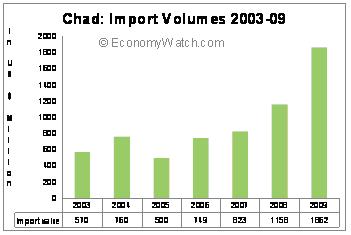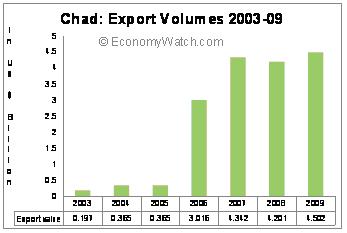Chad Trade, Exports and Imports
Please note that we are not authorised to provide any investment advice. The content on this page is for information purposes only.
Chad is one of the few African countries that has experienced a trade surplus after 2000. Chad’s trade comprises a large share of oil and cotton exports. The EU and the US are the most preferred trading partners of the country.[br]
Chad is one of the few African countries that has experienced a trade surplus after 2000. Chad’s trade comprises a large share of oil and cotton exports. The EU and the US are the most preferred trading partners of the country.[br]
Chad Trade: Exports
Crude oil is the most prominent export product for Chad’s economy. The country exports approximately 157,900 barrels per day, according to the 2007 figures. It ranks 54 in the world in terms of total oil exports. As of 2009, Chad has approximately 1.5 billion bbl in oil reserves. This sector also attracts huge foreign investment. The biggest Chadian oil production unit is controlled by ExxonMobil. Crude oil is likely to continue to fuel the country’s economy for several years.
Before oil production began in Chad, cotton used to be the dominating export product. The Chad cotton industry declined due to a fall in the international cotton prices since 2000. However, the government is seeking foreign investment to revive the cotton industry in the country.
According to the 2009 figures, the country’s total export volume stood at US$4.502 billion. Major items of export are oil, cotton, cattle and gum Arabic. The US is the largest trade partner, accounting for almost 90% of the Chad exports.
Chad Trade: Imports[br]
According to the 2009 statistics, Chad imports grossed over US$1.8 billion. Machinery and heavy equipment continue to be the major import items. Chad also imports textile material, food and consumer goods on a large scale. The EU is the most significant import partner for the country, accounting for more than 25% of the total import volume. It is followed by Cameroon, China, the US and Germany.

Official statistics related to the Chad economy are not precise. This is particularly due to significant informal trade with the neighboring nations. A large portion of the external trade, such as camel selling, goes unrecorded, which affects the accuracy of the international figures.





